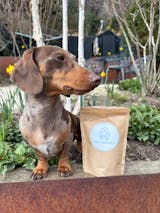Sustainability
Plastic Free
We conducted a 10-day study* on plastic waste generated from owning a dog, and the biggest contributor to non-recyclable plastic waste after poo bags was… that of treat packaging! A large majority of dog treats are still packed in not readily recyclable plastic that continues to add to our planet’s plastic pollution crisis.
(*UK based survey conducted in 2021)
Our Plastic-Free Treats are packaged in paper bags that are compostable and recyclable, with a starch-based resealable zip lock to retain freshness!
SUSTAINABLE INGREDIENTS & CHEWS
We have sourced treats with ingredients that offer a sustainable benefit where possible.
For example, fish skin is a regular waste product from the fish meat industry.
We utilise a lot of ‘offal’ e.g. organ meats and animal by-products (tendons, ears, tails) ... parts that would have been thrown away, hence reducing food waste!
Despite being highly nutritious and tasty, offal is regularly thrown away in vast quantities due to poor public perceptions!
Reducing meat consumption and utilising this often-wasted food source are two the biggest things we can do to significantly reduce our emissions from food.
Hygiene Practices
For handling and feeding natural chews and animal parts:
While some are air dried, please treat such chews and treats in a similar way to raw food
Taking excellent hygiene precautions is essential for the safe feeding of raw diets.
- Hand washing should commence:
- After food preparation
- After touching the pet - Preparation areas and surfaces should be cleaned with disinfectant immediately after food is prepared.
- Clean food bowls should be used for each meal.
- Bowls, floors and utensils should be disinfected immediately after feeding has finished.
- Bowls or plates for pet use should be kept separate from the ones used by the owners. Washing of bowls and plates alone is not enough to eliminate bacteria such as Salmonella 53.
- Correct storage of foods will reduce the cross-contamination risk:
- Any uncooked meats should be refrigerated in a sealed container
- Uncooked meats should be stored away from human food (i.e. at the bottom of the refrigerator or, ideally, in a separate refrigerator – although this does not appear to be a contributing factor to the incidence of infection according to a recent study). - Care is needed when handling pets and areas that the pet has contact with, especially areas used for elimination:
- Studies have shown that pets infected with pathogenic bacteria can shed them into the environment 22. Therefore, the following precautions should be observed:
- Wear gloves or wash hands immediately after any handling or contact with urine or faeces
- Swift disinfection of areas within the home where inappropriate elimination has occurred
- Fastidious clearing or cleaning of elimination areas within the owner’s garden
- High general levels of environmental cleanliness and regular washing of bedding are also advisable, although further work is needed to ascertain whether washing would be sufficient for pathogen removal
- Consideration should also be given to taking dogs to public areas, which may be difficult or impossible to clean - Method of feeding:
Due to its high moisture content and potential for pathogenic contamination, it is not advisable to feed raw diets on an ad libitum basis. As with any food, an appropriate daily ration (based on the maintenance energy requirement of the dog or cat) should be fed in meals, with uneaten food being removed after 30 minutes, disposed of and never reoffered to the pet.
(taken from the british small animal veterinary association guide to nutrition: raw diets).
































